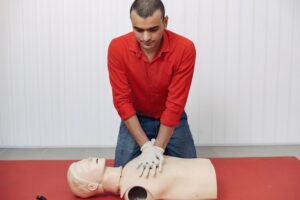
Introduction-
Hey everyone, Dr. Ashish Agrawal here. Today, let’s talk about something vital and urgent: cardiac arrest. Picture this: you’re at a family gathering, laughing and sharing stories when suddenly, someone collapses. That’s cardiac arrest in action – unexpected and swift.
It’s not just a scene from a dramatic movie; it’s real, and it could happen to anyone, anytime. Understanding what cardiac arrest is, could mean the difference between life and death. It’s a topic close to my heart, and I’m here to guide you through it.
So, let’s dive in and unravel the mystery of cardiac arrest together.

Demystifying Cardiac Arrest: What Cardiac it Is?
So, what exactly is cardiac arrest?
Let’s break it down in simple terms. Imagine your heart as the electricity supply for a bustling city. Suddenly, there’s a power outage. Everything stops. That’s cardiac arrest for your heart.
It’s when your heart unexpectedly stops beating, cutting off the blood flow to your brain and other vital organs.
It’s not a heart attack, which is more like a blocked pipe reducing water flow. Cardiac arrest is an immediate shutdown. It’s sudden and, without quick action, can be deadly.
Understanding this can be a real lifesaver. It’s why knowing what cardiac arrest truly is, matters so much.

Recognizing the Alarm Bells: Symptoms of Cardiac Arrest
Catching the early signs of cardiac arrest can be tricky. It’s like trying to spot a storm before it hits. Most times, cardiac arrest strikes without warning. The person may suddenly collapse, become unresponsive, and stop breathing.
There’s no pulse. It’s like flipping a switch off – everything shuts down abruptly.
But sometimes, there are subtle signs. Maybe a feeling of dizziness, chest discomfort, or shortness of breath. It’s like your body’s sending SOS signals before the main power cut.
These symptoms might happen minutes before cardiac arrest strikes. So, if you notice these signs, especially in someone with heart problems, don’t wait. Act fast. Quick thinking could save a life.
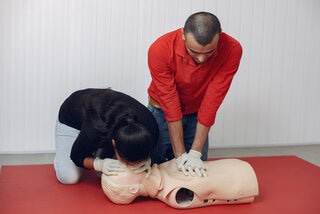
The Race Against Time: Immediate Response
When cardiac arrest strikes, every moment is precious. It’s like a fuse rapidly burning down, and quick action can stop the explosion. This isn’t the time for hesitation; it’s a time for immediate, life-saving steps.
First things first: Call emergency services. It’s like sending out an SOS – the sooner, the better. Then, CPR (Cardiopulmonary Resuscitation) needs to kick in. Think of CPR as manually keeping someone’s heart going. It’s doing the job the heart can’t do at that moment.
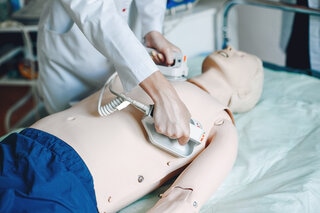
If there’s an Automated External Defibrillator (AED) nearby, it’s a game-changer. It can restart the heart like a reboot button on a computer. Using it might sound intimidating, but it’s designed for anyone to use, with clear instructions.
In this race against time, your actions could be the difference between life and death. So, don’t pause, don’t doubt. In cardiac arrest, your quick response is the most powerful weapon.
Unveiling the Culprits: Causes of Cardiac Arrest
So, what exactly sets off cardiac arrest? It’s like detective work to pinpoint the culprits.
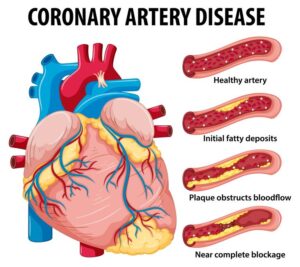
One major player is coronary heart disease. Think of it as plumbing issues in your heart’s arteries. They get clogged, and boom, the heart struggles.
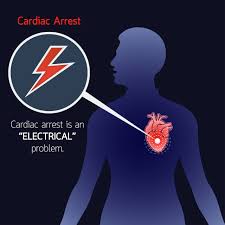
Understanding your risk is like having a Sometimes, it’s an electrical problem. The heart’s rhythm goes haywire. It’s like a DJ messing up the beats per minute, throwing the whole dance floor – your heart – into chaos.
Then there are triggers like severe physical stress, major blood loss, or intense physical activity. It’s like pushing an already-tired car to go up a steep hill. Other factors include drug overdose or significant imbalances in the blood.
Understanding these triggers is key. It’s about knowing what to look out for, just like avoiding roads that always lead to traffic jams. The more we know, the better we can guard against cardiac arrest.
Assessing the Risk: Who is Vulnerable to Cardiac Arrest?
Now, let’s talk about who’s at risk for cardiac arrest. It’s like knowing which areas of town are prone to blackouts. Some people are more likely to experience this sudden ‘power outage’ in their heart.
People with a history of heart disease are like houses in those blackout-prone areas. They’re more likely to face cardiac arrest. This includes those who’ve had previous heart attacks or heart conditions from birth.
Then, there are lifestyle factors. Think of them as the daily habits that might overload the electrical system. Smoking, high blood pressure, obesity, and a sedentary lifestyle – they all crank up the risk.
Age and gender play a role too. Like older buildings, older people have a higher risk. And men are more prone than women, statistically speaking.
weather radar. You might not prevent the storm, but you can surely prepare for it.
After surviving a cardiac arrest, the journey back to health is like a road trip to recovery. It starts in the hospital, where you’ll be closely monitored. This is to ensure your heart and brain are getting back on track.

The Road to Recovery: Post-Cardiac Arrest Care
Once you’re home, rest is your best friend. It’s like recharging your body’s battery after a blackout. Your doctor will probably recommend cardiac rehabilitation. Think of it as a guided workout for your heart, helping it regain strength.
Medication becomes part of your daily routine. They’re like the safety checks you do before a long drive. These medicines help regulate your heart’s rhythm and prevent future cardiac arrests.
Also, there’s a big focus on lifestyle changes. Eating healthier, exercising more, quitting smoking – it’s all about giving your heart a smoother ride.
The recovery road can be long, but every step forward is a victory. It’s about patience, care, and making heart-friendly choices. Remember, your heart’s been through a lot. Now, it’s time to take care of it.
A Proactive Stance: Preventing Cardiac Arrest
Preventing cardiac arrest is a bit like caring for your favourite car. Regular maintenance is key. So, let’s talk about how you can keep your heart running smoothly.
First, focus on your diet. Eating healthy is like using premium fuel for your car. It keeps everything running efficiently. Incorporate fruits, veggies, and whole grains, and cut down on the fatty, fried stuff.
Next, exercise regularly. It’s like taking your car for a spin, ensuring everything’s working fine. Aim for at least 30 minutes of moderate exercise most days of the week.
Don’t forget to monitor your health. Keep an eye on blood pressure and cholesterol levels, just like you’d watch the oil and coolant levels in your car.
If you smoke, it’s time to quit. Smoking is like throwing sand in your engine – it’s only going to cause damage.
Finally, manage stress. High stress is like constantly running your engine on high. Find ways to relax and cool down.
Remember, taking care of your heart is an ongoing process. It’s about making small, daily choices that add up to a healthy heart. You’ve got this!
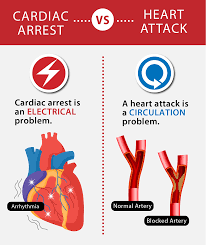
Cardiac Arrest vs Heart Attack: Understanding the Difference
Alright, let’s clear up a common mix-up: cardiac arrest vs. heart attack. They’re not the same, though often confused.
Think of a heart attack as a plumbing problem. It happens when blood flow to a part of the heart gets blocked. It’s like a clogged pipe in your house, disrupting water flow. The heart is still beating, but it’s struggling.
On the other hand, cardiac arrest is an electrical issue. It’s sudden and occurs when the heart malfunctions and stops beating unexpectedly. Picture your home’s power suddenly going off. Everything stops working; that’s what happens to your heart during cardiac arrest.
Both are serious, but they’re different beasts. It’s crucial to know this, so you can react appropriately. Knowledge here is not just power; it’s life-saving.
Conclusion-
As we wrap up, remember that cardiac arrest is like an unexpected storm. It can hit hard and fast. But you’re not powerless. Knowing what it is, recognizing the signs, and understanding the response can make all the difference.
Taking care of your heart is like nurturing a precious garden. It requires attention, care, and sometimes, a bit of hard work. Eating right, staying active, keeping stress at bay, and regular check-ups are your tools. They help you cultivate a strong, healthy heart.
And if you’re ever in doubt, reach out to your doctor. They’re like the knowledgeable gardener who can help you find the best way to care for your heart.
Let’s not take our heart for granted. It’s the only one we’ve got. So, let’s pledge to keep it beating strong and healthy. Here’s to heart-healthy lives for all of us!
